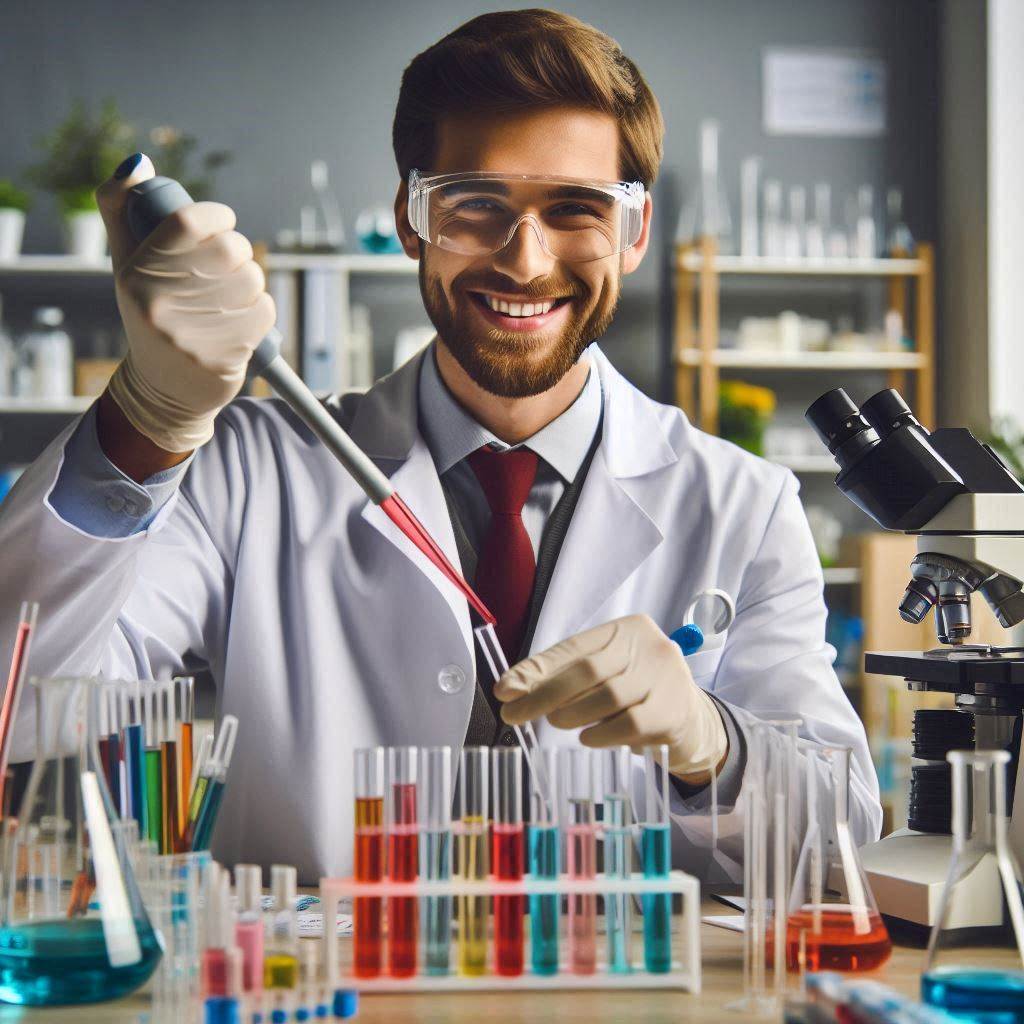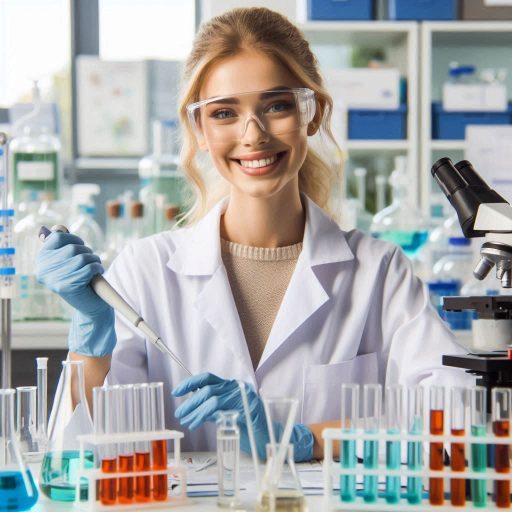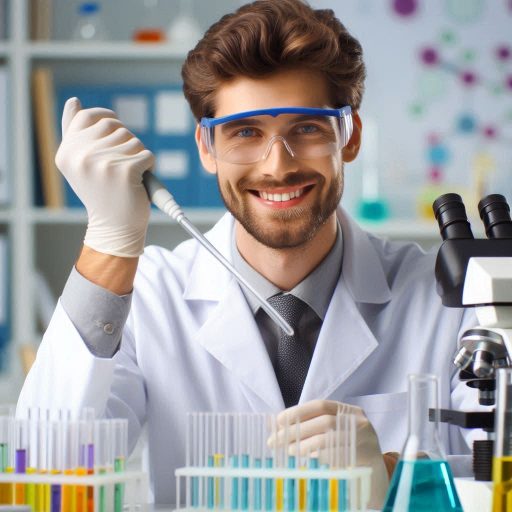Introduction
Overview of the Role of Lab Technicians in Healthcare Settings
Lab technicians are essential in healthcare, performing diagnostic tests that provide crucial information for patient care.
They analyze samples such as blood, urine, and tissue to help diagnose diseases, monitor health conditions, and guide treatment decisions.
Their accuracy and efficiency are pivotal in ensuring effective patient outcomes.
Importance of Education and Training for Lab Technicians
Education and training are fundamental for lab technicians to excel in their roles.
A solid educational foundation, typically starting with an associate degree, provides the necessary knowledge in science and lab techniques.
Hands-on training and practical experience are also crucial for mastering the use of complex equipment and performing precise tests.
Ongoing professional development helps technicians stay current with advancements in technology and methodologies.
Discussing Educational Requirements in This Post
This post aims to outline the educational requirements for lab technicians, emphasizing the need for formal education, practical training, and continuous learning.
Understanding these requirements is vital for aspiring lab technicians seeking to build a successful career in this critical healthcare field.
High School Diploma or GED
Basic Educational Requirement for Entry-Level Lab Technician Positions
A high school diploma or GED is the basic educational requirement for entry-level lab technician positions.
Employers look for candidates with this qualification to ensure they have a fundamental education.
This level of education provides the essential skills needed to begin training in laboratory work.
Without a high school diploma or GED, candidates may struggle to meet the basic job requirements.
This requirement sets the foundation for understanding the technical and procedural aspects of lab work.
Importance of Having a Strong Foundation in Math and Science
A strong foundation in math and science is crucial for aspiring lab technicians.
These subjects are the backbone of laboratory work, where precise measurements, calculations, and data analysis are routine.
Math skills, especially in algebra and statistics, help in accurately interpreting experimental results.
Science courses like biology, chemistry, and physics provide the knowledge necessary to understand lab procedures and equipment.
A solid understanding of these subjects enables lab technicians to perform their duties effectively and efficiently.
Some Employers May Require Specific High School Coursework in Science Subjects
Some employers may require specific high school coursework in science subjects for lab technician positions.
These courses ensure that applicants have the necessary background to succeed in the role.
Biology, chemistry, and physics are often the most critical courses, providing a strong foundation for lab work.
Employers value candidates who have taken these courses because they demonstrate a commitment to and understanding of scientific principles.
This requirement can make a significant difference in a candidate‘s ability to secure an entry-level lab technician job.
Read: Field vs. Office Work in Surveying and Mapping
Associate’s Degree in Medical Laboratory Technology or Related Field
The common educational path for aspiring lab technicians
An Associate’s Degree in Medical Laboratory Technology or a related field is a popular educational route for aspiring lab technicians.
This degree provides a comprehensive foundation, preparing students for entry-level positions in various laboratory settings.
The program typically spans two years and offers a blend of classroom instruction and practical training.
This educational path is highly valued because it equips students with both the theoretical knowledge and hands-on experience necessary for a successful career in the medical laboratory field.
The curriculum Typically Includes Courses in Biology, Chemistry, and Lab Techniques
The curriculum for an Associate’s Degree in Medical Laboratory Technology usually includes a range of courses in biology, chemistry, and specialized lab techniques.
Students begin with fundamental courses in biology, where they learn about cellular biology, human anatomy, and physiology.
These courses provide essential insights into how biological systems function, which is crucial for understanding lab tests and results.
Chemistry courses cover both general and organic chemistry, focusing on chemical reactions, compound analysis, and the role of chemistry in laboratory procedures.
Additionally, students take specialized courses in lab techniques, which teach them about various laboratory instruments, sample processing, and analytical methods.
Hands-On Training in Laboratory Settings to Develop Practical Skills
A significant component of the Associate’s Degree program is hands-on training in laboratory settings.
This practical experience is vital for developing the skills necessary to perform laboratory tasks accurately and efficiently.
During this training, students work directly with laboratory equipment, such as microscopes, centrifuges, and spectrophotometers.
They also practice procedures like blood draws, sample analysis, and reagent preparation.
This hands-on approach helps students learn how to handle specimens, troubleshoot issues, and maintain equipment properly.
By working in a real-world lab environment, students gain valuable experience in applying theoretical knowledge to practical situations.
This experience enhances their problem-solving abilities and prepares them for the demands of a professional lab technician role.
The combination of coursework and hands-on training ensures that graduates are well-equipped to meet the challenges of the field.
They develop a thorough understanding of laboratory practices and are prepared to perform their duties with precision and confidence.
Overall, an Associate’s Degree in Medical Laboratory Technology is a critical step for those aiming to build a successful career in the medical and scientific communities.
Read: Importance of Accuracy in Surveying and Mapping
Bachelor’s Degree in Medical Technology or Clinical Laboratory Science
Advanced educational option for lab technicians seeking higher positions or specialization
A Bachelor‘s Degree in Medical Technology or Clinical Laboratory Science is an advanced educational option for lab technicians aiming for higher positions or specialization.
This degree represents a significant step beyond the associate’s level, offering a deeper and broader understanding of laboratory practices and scientific concepts.
It is designed for those who aspire to advance their careers, whether through management roles, specialized technical positions, or research opportunities.
The program typically spans four years and provides a thorough education in both theoretical and practical aspects of medical technology and clinical laboratory science.
More In-Depth Study of Laboratory Procedures and Scientific Principles
The Bachelor‘s program includes a more in-depth study of laboratory procedures and scientific principles than associate-level coursework.
Students explore advanced topics in areas such as immunology, microbiology, and hematology.
They also delve into the intricacies of laboratory instrumentation, advanced diagnostic techniques, and quality assurance processes.
This comprehensive curriculum ensures that students gain a thorough understanding of complex laboratory procedures and the scientific principles underlying them.
This knowledge is crucial for performing advanced tests and managing sophisticated laboratory equipment, which is essential for roles that require high levels of expertise.
Opportunities for Research and Advanced Clinical Practice
A Bachelor‘s Degree program often includes opportunities for research and advanced clinical practice.
Students may engage in research projects that contribute to the development of new diagnostic methods or improve existing techniques.
These research opportunities allow students to apply their knowledge in practical, impactful ways.
Additionally, the program usually includes advanced clinical practice components, where students work in various healthcare settings to gain experience with complex cases and sophisticated lab procedures.
This experience is invaluable for those seeking roles in specialized fields or aiming for leadership positions within laboratory settings.
Through research and advanced practice, graduates enhance their skills and prepare for the evolving demands of the medical technology field.
Overall, a Bachelor‘s Degree in Medical Technology or Clinical Laboratory Science equips lab technicians with the advanced knowledge and skills necessary for career advancement.
It opens doors to specialized roles, research opportunities, and leadership positions, making it a vital step for those committed to advancing their careers in the field of medical technology and clinical laboratory science.
Read: Surveying and Mapping Technician: Job Satisfaction

Certification and Licensing
Certification and licensing are essential requirements for lab technicians in most states.
These credentials ensure that technicians meet the professional standards necessary for performing laboratory work safely and effectively.
The certification process typically involves passing national certification exams and fulfilling continuing education requirements.
Both certification and licensing are crucial for maintaining a high standard of practice in the medical laboratory field.
Requirement for Lab Technicians in Most States
In many states, certification and licensing are mandatory for lab technicians.
These requirements help regulate the profession and ensure that all technicians have the necessary skills and knowledge.
Without certification, technicians may not be eligible to work in certain healthcare settings or perform specific tasks.
State regulations vary, but certification often enhances a technician’s job prospects and professional credibility.
Meeting these requirements demonstrates a commitment to maintaining industry standards and provides assurance to employers and patients alike.
National Certification Exams Such as ASCP or AMT
National certification exams, such as those offered by the American Society for Clinical Pathology (ASCP) or the American Medical Technologists (AMT), are commonly required.
These exams test a technician‘s knowledge and skills in various aspects of laboratory work.
The ASCP offers certifications for various laboratory specialties, including medical technologists and medical laboratory technicians.
The AMT provides certifications in areas such as clinical laboratory science and medical assisting.
Passing these exams is a significant achievement that validates a technician‘s expertise and enhances their career prospects.
Continuing Education Requirements to Maintain Certification and Stay Up-to-Date on Industry Standards
Maintaining certification requires ongoing education to stay current with industry standards and advancements.
Certified lab technicians must complete continuing education courses periodically to renew their credentials.
These courses cover new technologies, updated procedures, and emerging trends in laboratory science.
Continuing education ensures that technicians remain knowledgeable about the latest developments in the field, which is vital for providing high-quality patient care and performing accurate tests.
It also helps technicians adapt to changes in technology and regulatory requirements, thereby maintaining their professional competence.
In summary, certification and licensing are integral to the profession of lab technicians.
They ensure that technicians are qualified and up-to-date with industry standards, enhancing both their career opportunities and the quality of laboratory services.
Read: Online Courses for Surveying and Mapping Technicians
Transform Your Career Today
Unlock a personalized career strategy that drives real results. Get tailored advice and a roadmap designed just for you.
Start NowSpecialized Training and Experience
Specialized training and experience play a crucial role in advancing a lab technician‘s career.
Opportunities to focus on specific areas, such as microbiology or hematology, can open doors to advanced roles and increase job satisfaction.
Gaining specialized skills and knowledge is essential for those looking to excel in niche areas of laboratory work.
Additionally, ongoing professional development ensures that lab technicians stay competitive and proficient in their chosen specialties.
Opportunities for Lab Technicians to Specialize in Areas Such as Microbiology or Hematology
Lab technicians have opportunities to specialize in various fields, including microbiology and hematology.
Specializing in microbiology involves studying microorganisms, such as bacteria and viruses, and their impact on health.
This area often requires advanced techniques for isolating and identifying pathogens.
Hematology, on the other hand, focuses on blood and blood disorders.
Specialization in hematology involves performing complex tests to diagnose conditions like anemia or leukemia.
Each specialty demands in-depth knowledge and skills, which can lead to more advanced job roles and responsibilities.
On-the-Job Training and Work Experience Can Be Valuable for Career Advancement
On-the-job training and hands-on work experience are invaluable for career advancement in laboratory settings.
Practical experience allows technicians to apply their theoretical knowledge in real-world scenarios, enhancing their problem-solving and technical skills.
Working directly with sophisticated equipment and complex procedures provides insights that formal education alone cannot offer.
Gaining experience in various laboratory settings can also help technicians discover their areas of interest and expertise, positioning them for specialized roles or leadership positions.
Continuing Education and Professional Development to Stay Competitive in the Field
Continuing education and professional development are essential for staying competitive in the field of laboratory technology.
As medical science and technology evolve, lab technicians must keep up with new techniques, regulations, and industry standards.
Professional development opportunities, such as workshops, seminars, and certification renewals, provide updates on the latest advancements and best practices.
Engaging in continuing education helps technicians maintain their expertise, adapt to technological changes, and enhance their career prospects.
It also demonstrates a commitment to ongoing learning and professional growth.
Specialized training and experience are vital for advancing in the field of laboratory technology.
By focusing on specific areas, gaining hands-on experience, and pursuing ongoing education, lab technicians can enhance their skills, increase their job opportunities, and remain competitive in a dynamic industry.
Find Out More: Safety Protocols for Solar Photovoltaic Installations
Importance of Accredited Programs
Choosing an accredited educational program is crucial for anyone pursuing a career as a lab technician.
Accreditation by recognized bodies, such as the National Accrediting Agency for Clinical Laboratory Sciences (NAACLS), ensures that the program meets established industry standards.
Accreditation guarantees that the education and training provided are of high quality and relevant to the demands of the profession.
Furthermore, attending an accredited program can be essential for meeting certification and licensing requirements.
Choose Educational Programs Accredited by NAACLS or Other Recognized Accrediting Bodies
It is highly recommended to select educational programs accredited by NAACLS or other recognized accrediting bodies.
These organizations evaluate and approve programs based on rigorous standards that ensure comprehensive, up-to-date training.
NAACLS accreditation, for example, signifies that a program has met specific criteria related to curriculum quality, faculty qualifications, and clinical training opportunities.
Graduating from an accredited program often enhances employability and is a mark of quality in the eyes of potential employers.
Ensures Quality Education and Training That Meets Industry Standards
Accreditation ensures that the education and training provided by a program meet industry standards.
Accredited programs are regularly reviewed to ensure they deliver relevant and effective instruction in line with current laboratory practices.
This quality assurance is crucial for preparing students to handle the complexities of modern laboratory work.
Accredited programs also stay updated with advancements in technology and methodology, providing students with the most current knowledge and skills required in the field.
Accreditation May Be Required for Certification and Licensing Eligibility
In many cases, accreditation is a prerequisite for certification and licensing eligibility.
National certification exams and state licensing boards often require candidates to have completed an accredited educational program.
This requirement helps ensure that all candidates have received a standard level of training and possess the necessary skills for professional practice.
Without an accredited background, individuals may not be eligible to sit for certification exams or obtain the required licenses, which can limit career opportunities.
In summary, attending an accredited program is essential for anyone pursuing a career as a lab technician.
Accreditation by bodies like NAACLS ensures high-quality education, adherence to industry standards, and eligibility for certification and licensing.
Choosing an accredited program not only supports professional development but also enhances career prospects in the competitive field of laboratory technology.
Delve into the Subject: Innovations in Nuclear Waste Management
Advantages of Advanced Education
Pursuing advanced education offers significant advantages for lab technicians, including improved job prospects, higher salary potential, and opportunities for specialized roles.
Higher education and specialized training not only enhance professional skills but also open doors to various career opportunities.
Lifelong learning and professional development are key to staying competitive and thriving in the dynamic field of laboratory technology.
Higher Education and Specialized Training Can Lead to Better Job Prospects and Higher Salary Potential
Advanced education and specialized training can substantially improve job prospects and increase salary potential.
A bachelor‘s degree or higher qualifications often lead to better job opportunities and eligibility for advanced positions.
Specialized training in areas like microbiology or clinical chemistry can further distinguish candidates from their peers.
This advanced education prepares technicians for roles that require more complex skills and responsibilities, which are often associated with higher compensation.
Investing in education can thus lead to a more rewarding career both professionally and financially.
Opportunities for Leadership Roles, Research, and Teaching in Laboratory Settings
Higher education provides opportunities for lab technicians to pursue leadership roles, research, and teaching positions within laboratory settings.
With advanced degrees, technicians can move into managerial or supervisory roles, overseeing lab operations and leading teams.
Research opportunities allow them to contribute to advancements in medical science and improve laboratory practices.
Additionally, advanced education opens doors to teaching positions, where they can educate and mentor future lab professionals.
These roles not only enhance career fulfillment but also offer the chance to shape the future of the field.
Importance of Lifelong Learning and Professional Development in the Field
Lifelong learning and professional development are crucial for maintaining expertise and staying relevant in the field of laboratory technology.
As medical science and technology continuously evolve, technicians must keep up with new advancements and practices.
Engaging in ongoing education through workshops, seminars, and certification renewals helps technicians adapt to changes and improve their skills.
This commitment to learning ensures that they remain competitive and capable of delivering high-quality laboratory services.
Continuous professional development is essential for career growth and adapting to the ever-changing demands of the industry.
Essentially, advanced education in laboratory technology offers numerous advantages, including better job prospects, higher salary potential, and opportunities for leadership and research.
Lifelong learning and professional development are vital for maintaining expertise and thriving in the field.
Investing in advanced education and ongoing learning ensures a successful and fulfilling career in laboratory technology.
Conclusion
Key Points on Educational Requirements for Lab Technicians
Lab technicians require a strong foundation in science, typically starting with an associate degree in a relevant field.
Core courses often include biology, chemistry, and laboratory techniques.
In addition to formal education, hands-on training is essential.
Internships or on-the-job training programs provide the practical experience needed to perform tasks accurately.
The Importance of Education, Training, and Professional Development in the Field
Education and training are crucial for lab technicians to stay competent in their roles.
The field is constantly evolving, requiring professionals to keep up with the latest technologies and methods.
Continuous professional development, including workshops and certifications, is essential for staying ahead.
This commitment to learning ensures that lab technicians can handle complex tasks with precision.
Encouragement for Aspiring Lab Technicians to Pursue Further Education and Certifications for Career Growth and Success
Aspiring lab technicians should pursue further education and certifications to enhance their career prospects.
Investing in education not only opens doors to advanced positions but also ensures long-term success in the field.
Continuous learning is key to career growth.
[E-Books for Sale]
The Big Book of 500 High-Paying Jobs in America: Unlock Your Earning Potential
$19.99 • 500 High-Paying Jobs • 330 pages
Explore 500 high-paying jobs in America and learn how to boost your career, earn more, and achieve success!
See All 500 High-Paying Jobs of this E-Book
1001 Professions Without a Degree: High-Paying American Jobs You Can Start Now
$19.99 • 1001 Professions Without a Degree • 174 pages
Discover 1001 high-paying jobs without a degree! Unlock career tips, skills, and success strategies for just $19.99!




